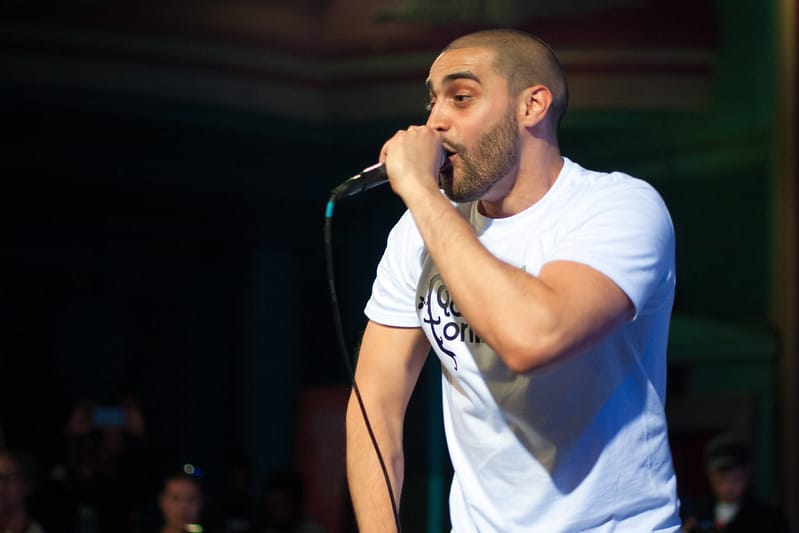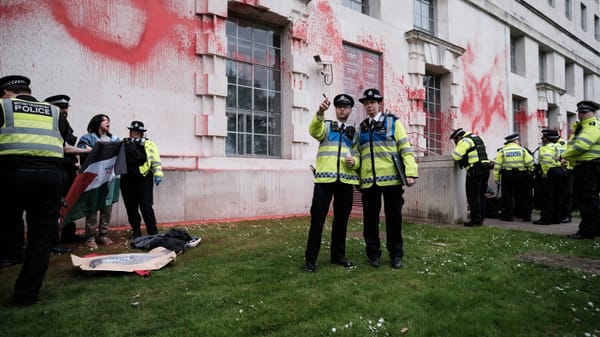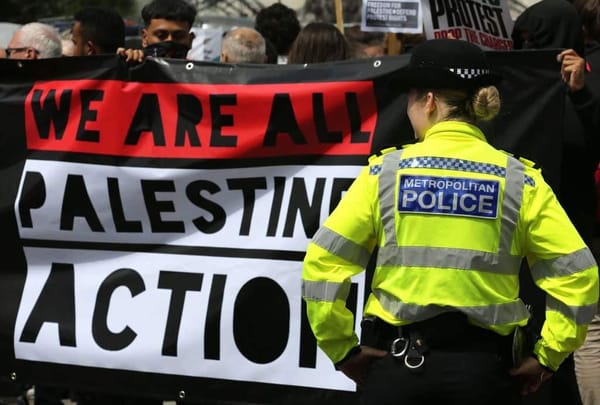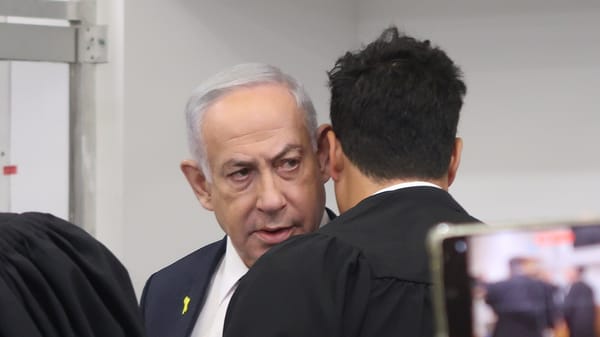Why we’re still fighting antisemitism on the right’s terms
The controversy at the NUS shows we must fight antisemitism within a broader anti-racist struggle that combats the right’s attempts to rule through division.

It’s been a tumultuous few weeks for Jewish student politics in the UK.
It began three weeks ago when the National Union of Students (NUS) announced that Lowkey – a rapper and vocal supporter of Palestinian liberation – would be appearing at its annual conference in late March. This set off a series of events so predictable it could have been scripted: the Union of Jewish Students (UJS) and Jewish Chronicle (JC) attacked NUS over its decision to invite Lowkey on the grounds that his presence would make Jewish students feel unsafe. The right-wing national media joined the chorus, and Lowkey eventually withdrew from the conference.
Unsatisfied with this outcome, the hasbara group We Believe in Israel launched a campaign to have some of Lowkey’s music, along with that of other pro-Palestinian artists, removed from Spotify. In response, dozens of artists and celebrities have come to Lowkey’s defence. For those already sceptical of the barrage of antisemitism accusations launched against the left in recent years, this episode has reinforced their opinion that these are nothing but a tool to stifle criticism of Israel.
An almost identical dynamic played out in the election of the new NUS president Shaima Dallali, another outspoken advocate of the Palestinian cause. Ahead of the election, UJS leaders and the JC denounced Dallali for a number of old social media posts going back a decade, voicing concerns that the NUS was displaying a lack of regard for antisemitism despite its commitment to antiracism. Again, the right-wing national press followed suit.
The tweets in question are a mixed bag. Some are problematic, such as one referencing the Battle of Khaybar, in which the Prophet Muhammad’s army massacred Jews in Arabia (a tweet sent in 2012, when Dallali was a teenager, and for which she has recently apologised), or another praising an Islamic scholar who has promoted violence against Jews. Yet others are wholly unobjectionable on grounds of antisemitism, including articulating support for the Boycott, Divestment and Sanctions (BDS) movement or critiquing UJS’s celebration of the ultra-nationalist Israeli holiday, Yom Yerushalayim (Jerusalem Day).
I do not seek here to suggest that there is nothing of concern in the past statements and actions of either of these two individuals. In addition to Dallali’s tweets, Lowkey recently appeared on Iran’s state-owned Press TV alongside former Labour MP Chris Williamson and former Bristol University academic David Miller – both of whom have been repeatedly accused even by Jewish leftists, and indeed parts of the wider left, of engaging in antisemitism and conspiratorial thinking about Jews.
In both cases, however, the churlish “exposure” of past wrongs has taken the place of serious and necessary conversations about antisemitism and rebuilding solidarity, producing a familiar pattern of political point-scoring and a retreat into warring factions. Amid resurgent mainstream support for Palestinian liberation following the events of May 2021 in Israel-Palestine, Labour’s failure to gain power under Jeremy Corbyn, the ostracism of Jews from the left, and increasing scrutiny of the conflation of antisemitism and anti-Zionism, there is an urgent need for a paradigm shift: both in how the left thinks about antisemitism, and in how Jewish people engage in anti-racist struggles beyond our own.
Jewish exceptionalism
What is clear from the furore surrounding Lowkey and Dallali is that the battle over antisemitism in the UK has shifted from the Labour party to universities. It shouldn’t have to be said that Jewish students deserve to feel safe and welcome in higher education spaces; NUS’ suggestion that Jewish students concerned by Lowkey’s attendance at their conference could head during his performance into the “quiet space” reserved for attendees with disabilities or neurodivergence was as ableist as it was absurd. And it is indeed concerning that parts of the left continue to consider any recognition of antisemitism to be some kind of capitulation to the right or the “Zionist lobby.”
Part of the left’s shortcomings over antisemitism in recent years have stemmed from a lack of understanding regarding how it operates and an unwillingness to view Jewish concerns beyond the prism of Israel and Zionism. Unless this is rectified, not only will progressive antiracism lack credibility, but antisemitism will continue to be an effective tool for the right to attack and likely defeat progressive movements. Without meaningful engagement with the reality of antisemitism in our society, the left will continue to alienate Jews from taking part in the movement, undermining its own power.
And yet, the public confusion generated by the national conversation over the past six years as to what constitutes antisemitism means that it isn’t surprising that sometimes folks get it wrong. This confusion has been enabled in large part by the conflation of antisemitism with criticism of Israel, particularly through the aggressive campaign – in which UJS has been a key player – for the widespread adoption of the International Holocaust Remembrance Alliance (IHRA) working definition on antisemitism. Our communal establishment’s unwavering support for Israel, and unwillingness to think more critically about Zionism, threatens to keep British Jews at the margins of progressive struggles.
The events of recent weeks have further exposed an uncomfortable truth: the Jewish community needs to do better in its own framing of antiracism and solidarity. Days after decrying the NUS’ disregard for antisemitism, UJS (which earlier this year denounced King’s College London Palestine Society for hosting the founder of the BDS movement, Omar Barghouti) promoted and offered free tickets to last week’s Jerusalem Post London Conference on Fighting Antisemitism, whose keynote speakers included one of the UK’s most Islamophobic MPs, Michael Gove, as well as far-right Israeli ministers Ayelet Shaked and Avigdor Lieberman, both of whom have a long history of anti-Palestinian racism.
There is also something frankly disturbing in our community’s willingness to drag the reputations of high-profile people of colour through the mud. Lowkey and Dallali are the latest in a long line of individuals that includes footballers Marcus Rashford and Jesse Lingard and MP Zarah Sultana, among others. This unmistakable pattern ultimately results in a perception of our communal organisations as committed to Jewish exceptionalism rather than universal antiracism, making it far harder for others to heed their justifiable concerns about Jewish students.
A stark warning
In recent years, Jewish communal leaders have continued to ally with the right when attempting to combat antisemitism on campus. From widely publicised meetings with education secretary Nadhim Zahawi – who recently said that students heard chanting the phrase “from the river to the sea [Palestine will be free]” should be referred to the police – to Boris Johnson’s recent trailing of an antisemitism task-force, it is worth asking why the Conservative party, which so aggressively attacks other marginalised and minoritised communities, feels so comfortable “tackling” antisemitism.
For those who have borne the brunt of the government's xenophobic and racist policies targeting communities of colour, such as the Prevent strategy or police violence, Jewish communal organisations’ continued willingness to ally with the Tories over other minorities in the fight against racism only fuels mistrust. Our reluctance to examine our ignorance of others’ oppression reduces the moral authority we have to call out real antisemitism when it arises.
The events of recent weeks are a stark warning to the left in general, and the Jewish left in particular. Antisemitism has been relegated to a factional dispute, with the right continuing to drive the divisive narrative that Jewish safety and Palestinian solidarity are incompatible. When we fail to call out these divide-and-rule strategies, and recognise antisemitism as a structural force that must be tackled as part of a broader anti-racism struggle, the right will continue to capitalise on this division.
If we are serious about building left power, we must reject this zero-sum analysis. Our best hope lies in the growing solidarity between Jews, Palestinians and all marginalised groups, based on a determination to end Israeli apartheid and a commitment to decolonisation and liberation for all. It will be far harder for the right to denigrate the left as antisemitic for supporting Palestinian liberation if Jews are vocal allies in this struggle. And by cultivating a better understanding of antisemitism on the left, we will ensure that Jewish safety is reaffirmed within the broader antiracist struggle, and undermine the right’s attempt to instrumentalise us for its own political agenda.
Em Hilton is an organiser and writer based between Israel-Palestine and London.




